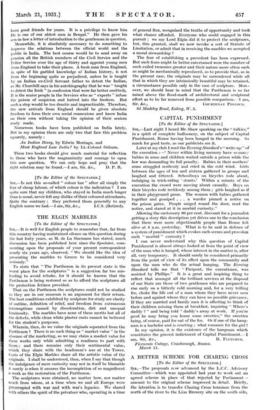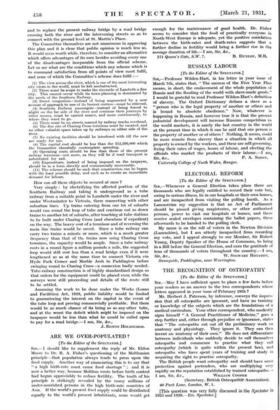A BETTER SCHEME FOR CHARING CROSS [To the Editor of
the SPECTATOR.] Sia,—The proposals now advanced by the L.C.C. Advisory Committee—which was appointed last year to work out an agreed scheme in place of that rejected by Parliament— amount to the original scheme improved in, detail. Briefly, the intention is to transfer Charing Cross terminus from the north of the-river to the Lion Brewery site on the south side,
and to replace the present railway bridge by a road bridge crossing both the river and the intervening streets so as to connect with the ground level at St. Martin's Place.
The Committee themselves are not unanimous in approving this plan and it is clear that public opinion is much less so. It would seem worth while, therefore, to consider an alternative which offers advantages of its own besides avoiding every one of the disadvantages inseparable from the official scheme. Let us see what are the conditions which any scheme which is to command satisfaction from all points of view must fulfil, and none of which the Conunittee's scheme does fulfil :-
(1) The view across the river, which is one of the most interesting city views in the world, must be left unobstructed.
(2) There must be scope to make the riverside of Lambeth a fine city. This cannot occur while its town-planning is dominated by the needs of the Southern Railway.
(3) Street congestion—instead of being augmented by a new avenue of approach to one of its busiest centres—must be relieved.
(4) Southern Railway passengers—instead of being forced to alight on the far side of the river and continue their journeys by
other means, must be carried nearer, and more continuously, to where they want to go.
(5) There must be no streets marred by railway tracks overhead. (6) The fine site of Charing Cross terminus must be vacated, and no other valuable space taken up by railways on either side of the river.
(7) No existing facilities should be interfered with till the new are ready for use. (8) The capital cost should be less than the £12,500,000 which the Committee cheerfully contemplate spending. (9) Operating costs should be less than those of the present railway terminus—not more, as they will be if road transport is substituted for rail.
(10) Expenditure, instead of being imposed on the taxpayer, should be in a form directly and commercially recoverable. (11) The scheme should be such that construction can be begun with the least possible delay, and such as to create an immediate demand for labour.
How can all these objects be secured at once f Very simply : by electrifying the affected portion of the Southern Railway and taking it underground as a tube railway from a suitable point in Lambeth under the river and under Westminster to Victoria, there connecting with other suburban lines. Up trains entering from one lot of suburbs would run round the loop of tube and continue out as down trains to another lot of suburbs, after touching at tube stations to be built under Charing Cross (and elsewhere if expedient) on the way. The heavy cost of a terminus and of reversing the main line trains would be saved. Since a tube railway can carry two trains a minute or more, which is a much greater frequency than that of tht, trains now using Charing Cross terminus, the capacity would be ample. Since a tube railway costs in a round figure a million pounds a mile, the suggested loop would still cost less than a road bridge even if it were lengthened so as at the same time to connect Victoria via Hyde Park Corner and Marble Arch to Paddington before swinging round to Charing Cross—a connexion badly needed. Tube-railway construction is of highly standardized design so that orders for the equipment could be placed even while the surveys were still proceeding and details of the route still to be settled.
Assuming the work to be done under the Works (Loans and Facilities) Act, 1929, public liability would be limited to guaranteeing the interest on the capital in the event of the tube loop not proving commercially profitable. But there would be as much chance of its being so as any other tube, and at the worst the deficit which might be imposed on the taxpayer would be less than what he would be called upon to pay for a road bridge.—I am, Sir, &c.,
J. EDWIN HOLMSTROM.



















































 Previous page
Previous page